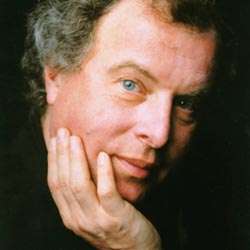|
Back
A Question of History New York
Avery Fisher Hall, Lincoln Center
04/03/2013 - & April 4, 5, 6, 2013
The Bach Variations: A Philharmonic Festival
Johann Sebastian Bach: Concertos for Keyboard Nr. 5 in F Minor, BWV 1056, & Nr. 3 in D Major, BWV 1054
Felix Mendelssohn: Sinfonia Nr. 9 in C Major “Swiss”
Robert Schumann: Symphony Nr. 4 in D Minor, Opus 120
New York Philharmonic Orchestra, András Schiff (Pianist & Conductor) 
A. Schiff (© Sheila Rock)
The description “a musician’s musician” has always seemed contemptuous. As if the performer is so rarefied, so clever that your basic elementary audience isn’t worthy to receive his gifts. András Schiff, though, actually is a musician who other musicians might envy. Not that other pianists would eschew their own idiosyncrasies, proclivities or propensities, but that they would hear Mr. Schiff as the template upon which they could begin.
True enough, I cannot think of any pianist who plays Bach solo klavier works with such clarity, even temperament and internal dignity. In other words, Mr. Schiff’s is not stolid scholarly Bach, but Bach whose music needs no justification and can lend itself to the fingers and minds of any artist.
A courtly gentleman, like the finest citizens of Budapest, Mr. Schiff showed three sides to his musicianship last night. He played the original harpsichord Bach concerti on the grand piano without apologies, he introduced an historical rarity and, for the first time, he conducted the New York Philharmonic Orchestra.
I frankly prefer the subtleties of Bach solo keyboard works on the piano (especially when a person like Mr. Schiff or Angela Hewitt is playing). But with orchestras, the timbres of the string orchestra with the big sounds of the piano are rather disconcerting at first. The notes are hit rather than plucked. The harpsichord can mingle with the sounds of the strings rather than stand out like a piano. The volume is less formidable than a piano, but it offers the original 18th Century intimacy. And since we have long ago dismissed Sir Thomas Beecham’s words that the harpsichord sounds like “cats copulating on a tin roof” , today the piano is almost an affectation.
Still, Mr. Schiff took a middle road out. No pedal was used to give an artificial legato, but no attempt was made to buffer the volume, so the piano towered over the full Phil string section. And if Mr. Schiff decided to play piano instead of harpsichord...well, he is still the ultimate Bach player. The intricate counterpoint never was a mass, but each skein stood out. Nor could any harpsichord be enabled to change bass line with treble line on repetitions the way Mr. Schiff did.
And while hypothesizing is useless, old J.S., had he heard our modern piano, might have looked to the heavens and said, “Now that was the sound I was looking for.”
After this Mr. Schiff left his Steinway, ascended the dais and led the strings again, this time in the Philharmonic (and doubtless the American) premiere of a Mendelssohn string symphony, one of twelve “sinfonia” which he wrote before the age of 15. This, the Ninth Sinfonia had, within its 23 minutes, some quite original tricks by the young Felix. A slow movement started with the violins playing solo, divided into four. The scherzo included a Swiss folk tune, which was presumably used for yodeling (though the proper young composer wouldn’t actually imitate those sounds). And of course the fugues and intricate counterpoint showed that, even at his earliest, Mendelssohn must have studied those Bach scores which he would later conduct.
Mr. Schiff conducted, stickless, with great animation, and almost made the four movement come alive. But not quite. Perhaps an enterprising conductor could add some winds, even a timpani or two, for more varied color.
One had no qualms with Mr. Schiff conducting Schumann’s Fourth Symphony. He again was highly animated (compared to, say, Alan Gilbert’s more nuanced movements with the Phil). But, like his Bach, András Schiff has both an empirical and innate understanding of the work. He allowed Assistant Concertmaster Sheryl Staples leeway in her subtle second movement solo, he played with moderate unhurried tempos, and he allowed the brass of the Philharmonic all the necessary grandeur to achieve a splendidly grand reading.
Harry Rolnick
|